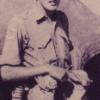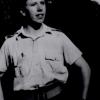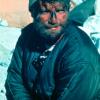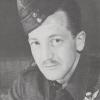We embarked on our planes from Barkston Heath Aerodrome in Lincolnshire on September 17 1944. It was a lovely sunny Sunday morning and we were all very pleased to be going into action at last after being briefed and stood to about 18 times since the invasion of Normandy. We took off at around midday – a great sight as we were going off 3 planes abreast down the runway. We were lucky as we didn’t meet with any opposition except a small amount of flak. I jumped out No. 2 after the Officer and we had a good landing; it wasn’t long before we had gathered up our containers etc. on our trollies and formed up with the 3rd Battalion with whom we were attached, then our stick of 10 men were detailed to stay on the drop zone (DZ) to help collect any ammunition etc. and put it in a small barn at the farm Kline Amerika. We then had to stay and guard it. By this time there were a lot of Dutch people on the DZ collecting parachutes etc. There wasn’t any opposition at that time although the Germans were soon in position in the woods facing us. We had to be careful as we were being shot at if we moved from the farm.
During Sunday afternoon a party of soldiers and some Dutchmen came with a coach and loaded it with ammunition and shells and escorted it away. I don’t know how far they got! During the evening we were shelled and the barn at the back of the farm was destroyed and two horses were killed. I think a battalion of the Border Regiment was left at the DZ to keep the woods clear of the Germans but they must have got back in, as later when the Gliders landed on the Monday they were under heavy fire and took up position to reply. We couldn’t see anything as the Germans were hidden in the woods about 500 meters away!
Our Cpl Cossadinas decided that we should more with the Glider Troops so we went under a Railway Bridge, I think at Wolfhezen and marched onto Oosterbeek. It was another lovely sunny day with no opposition until we dug out trenches on the green opposite the Hartenstein. It wasn’t long before we were attacked by 4 enemy fighters; there was also quite a lot of sniping going on but they were well hidden.
We were then told to take up positions in the narrow road leading to the Sonnenburg where we stayed the whole time dug in on the right side under the trees. We had a Bren gun position up forward near a wood were we took turns to watch. We only had food and water for 48 hours and were soon short of water. Sapper Campbell volunteered to go and fill some bottles at a well behind the Hartenstein, unfortunately he never came back and we were told that he was killed at the well as it was under fire from snipers. That was probably on the Tuesday.
From that day we were heavily shelled from morning until night, not able to move from our trenches. We had our second casualty on the Wednesday when Sapper Henry Sherwood had a shell land in his trench taking the top of his body away. We were very close to his trench to it was rather messy. We were under so much bombardment that we couldn’t get out to bury him for some hours.
Next day we had flame throwing tanks come along the road and we could hear the shrieks of people being burnt in their trenches. There was an anti-tank gun dug in at the end of the drive so I went back and set it on fire, and I think they may have damaged the other one as it soon went off the road into the edge of the wood.
An Officer of the 9th Field Company came and asked me to help carry some bombs to attack this tank which was in the woods, which we did. I think he hit the tracks and did further damage and as he had used up the bombs I made to go back to my unit. The Officer went behind some bushes and was never seen again. I think he was killed by a sniper nearby, as I was fired on whilst I was crawling back. I heard several shots fired at me – I was behind some fallen trees so was a difficult target and a very lucky person. Afterwards I went to try and locate this German who was causing the trouble. I went forwards and threw a smoke canister to cover my approach, but the wind took it the wrong way. Whilst I was there I saw 3 soldiers come nearby carrying an anti-tank Piat gun. They lodged it on a tree trunk ready to fire; I shouted to warn them that a sniper was close but they carried on and the soldier with the gun was killed instantly with a bullet right between his eyes. He just stayed leaning on the tree as if nothing had happened!
We were getting rather tired, dirty and very hungry but still in good spirits. Unfortunately, we were not getting any information on how things were going. We were surrounded and being heavily bombarded day and night, although we did manage to get a little rest at night. I remember going to a house over the main road to try for some water and all the family were in the cellar. I believe they had a new born baby there. I told them this would soon get better but it didn’t and later the Dutch civilians were allowed to leave under escort.
Every night there were houses being set on fire all around and I remember the Germans bringing a speaker into the woods nearby telling us to surrender. Two more of my friends were killed near the main road – Lance Cpl Shaw and Sapper Jeb Taylor together in a trench; also Tommy Hicks got hit with some shrapnel which temporarily paralysed him. I was able to pick some of the metal from his neck and helped him to the first aid house. Another boy with us was blinded by a shell burst and we were able to take him to the Medics. I never heard of him again.
One night Captain Stores took Tommy Hicks and another – they went down to where the Ferry was to see if it would be possible to be used again, but I don’t think it was of any use. At one time the 9th Company boys went through the woods with fixed bayonets to clear it.
We didn’t have any information about the 2nd Army who were to relieve us in 2 days and none of the wirelesses were working. Therefore things went from bad to worse. My best friend was killed by a mortar bomb landing on his head about the 8th day, although I didn’t see it. His name was Tom Brooks.
On the evening of the 9th day we were informed that we were going to try to escape over the river. It was a wet and windy night and we were gathered together in various units under Captain George of the 1st Para Engineers. We were told to wrap rags around our feet so as to make no noise, as we had to go near the German lines. We started off about 9.30 that evening with around 50 people. We crossed the main road and walked up the garden of one of the houses. At the end of the garden we went right – I think we should have gone left! We had gone about 100 metres when we were halted, not knowing who by. After a few minutes we moved on; we were then fired at by an automatic close by, hitting my friend Doug Chiltern in the eye and the arm. I was next to him at the rear. It appeared that it was our own people who were guarding the rear who thought we were Germans. We had to pass my friend over to them. He survived and was a prisoner.
We carried on to a junction where we came under machine gun fire. I had a Bren gun and with my Sgt Smith’s Sten gun we returned the fire, but we were unable to see anything. My Bren gun jammed – I suppose it was full of sand so I threw it away.
We marched on for a few miles and found ourselves lost. We went down a small track and at the bottom we were again stopped by the Germans. As we went on my friend Joe Davies was hit in the knee by a bullet, so us four at the rear of the group retreated and I bandaged my friend’s leg and helped him across a field where we were machine gunned at once again. We rolled under a wire fence and laid in a gully until things quieted down. After about 15 minutes I whispered to my friend that we should be going back. I didn’t get a reply and thought that he was dead. It appeared afterwards that he couldn’t walk so he would not hold us back. He laid there until daybreak and then gave himself up.
My friend Alec Johnstone had got past the Germans and walked to the river and swan over to freedom. That left me and Driver Whitehouse. We went back the way we came and had some near escapes. We went to rest in a school, but when we went to sit down we noticed about 50 pairs of German boots lined up so we decided to get out quickly. Carrying on up the road my mate wanted to give himself up, but I persuaded him to carry on, telling him we would rest in one of the nearby houses. We came to a bungalow on a corner and walked in – we got halfway down the basement stairs to find about 12 Germans resting there. Imagine the surprise (and shock) for us and them, because as we quickly retreated, they rushed after us, chasing us up the garden.
It was like daylight with the lights that they let off. We went through some bushes at the end of the garden into a field. We walked along a path on the edge of some trees. A German soldier passed on the narrow path not realising who we were, then I saw a party of Germans sitting round a fire only about 60 ft away. They didn’t see us as we carried on. Seeing some lights at the end of a narrow road, we kept to one side and walked along towards them; we came to a hill with trees right alongside. I told my friend that I would go forward and see what was happening. I had crawled about 30 metres when came across some trenches, then I heard somebody snoring. I went back for my mate and we crawled through and down the other side of the bank, through a wire fence, over a road and then we were only about 100 metres from the river. What a relief! We must have been walking 5 to 6 hours in the pouring rain. I was a good swimmer but my friend could not swim. I wouldn’t leave him so we walked along the riverside until we saw a building.
It was very dark, then we returned the other way and to our surprise we found 2 boats that had washed up. I think they had been used in evacuation and were sunk. Using some wood for the oars, I pushed out the boat until I was up to my neck in the water, then I jumped in. The tide was very strong and twisted us round in the water, but we managed to get to the other bank in safety, we thought. But to our surprise, against the skyline we saw a soldier. It was a few tense minutes as it could have been a German, but fortunately it was an Officer from the Dorset Regiment. He enquired if we had seen any of his men. He had sent out 200 men to help relieve us. I think they had all been captured.
Well, that is the end of my story, as in the morning we went to a school in Nijmegen, then the next day to Brussels and a flight home. On the day War ended I flew to Norway to supervise the Germans clearing all the mines etc. then I went to Palestine with the 6th Airborne Division and I was demobbed from Egypt May 1946.
By Leslie Plummer
Source: Leslie Plummer
Read More




Latest Comments
There are currently no comments for this content.
Add Comment
In order to add comments you must be registered with ParaData.
If you are currently a ParaData member please login.
If you are not currently a ParaData member but wish to get involved please register.